The Election Committee has announced the results of the 2011 Board Elections (determining three of the ten Trustees, see also the recent Signpost op-ed). In the Schulze method voting, the three incumbents came out on top of the 19 candidates, meaning that the Board remains unchanged:
These results were certified by the Board of Trustees, and the positions will be effective until the middle of 2013. A total of 3495 votes were cast, of which 71 were struck. A post mortem, including feedback from committee members and others, covers matters such as communication, candidate requirements, suffrage, and the electoral process.
A team from the Wikimedia Foundation (Frank Schulenburg and Annie Lin), two Foundation Fellows (PJ Tabit & Srikeit Tadepalli), an advisory board member of the US Public Policy Initiative (Professor Bob Cummings), and India National Programs' Hisham Mundol visited Pune, the eighth-largest metropolis in India, for three weeks to roll out the Wikipedia India Education Program. A full two-day workshop was conducted for 14 of the 22 campus ambassadors selected in India. An important aspect of the training (see photographs) was the involvement of the local Wikimedian community in specific sessions, and the inclusion of open-house discussions on Wikimedia and Wikipedia, led by User:AshLin, Mandar Kulkarni and Sudhanwa Jogalekar from Pune, Pradeep Mohandas from Mumbai, and Tinu Cherian from Bangalore.

There was debate on how rapid integration into the community can be catalysed by inviting campus ambassadors to join community meet-ups as well as mailing lists, Facebook pages, and twitter feeds. The importance of the local press was stressed in getting local coverage in Indian languages. Given the media consumption habits of students, ambassadors were invited to think about how to forge links with radio and television stations, and of organising photo opportunities. Several newspapers reported very positively on the program – The Hindu, Sakal, Indian Express Times of India and once more in The Hindu. The new Wikipedia campus ambassadors were invited to attend the 14th Pune Wikimeetup to interact with the Pune Wikipedian community.
In a two-day face-to-face weekend meeting on 11 and 12 June (Shaping the future of Wikimedia UK), Wikimedia UK board members made strategic decisions about the future of the chapter. As reported in the chapter's blog, the Board decided to go ahead with plans to recruit full-time staff. Currently, it is looking for a Chapter Manager to lead the organisation and work with the board of directors on strategy, partnerships, and fundraising; and an office manager, who will deal with membership, finance, and other administrative tasks (a part-time Office Manager had already been hired on an interim basis last year, as the chapter's first paid employee, see Signpost coverage: "Wikimedia UK appoints 'Office Manager'"). A professional recruitment agency has been engaged to select from a wide field of qualified candidates (job descriptions and budget).
In related news, Wikimedia UK and ARKive will collaborate on a project to improve Wikipedia's coverage of threatened species. ARKive is an initiative of the charity Wildscreen that aims to promote the protection of threatened species using the emotive power of wildlife films and photographs. The "Wikipedia Outreach Ambassador", yet to be recruited, will involve a fixed-period in-residence role for a volunteer who will use deskspace at ARKive's offices in Bristol, with travel and subsistence supported by the chapter. The ambassador's role will require both onwiki activity and involvement in the wider community through online and offline events.

As already mentioned in last week's "News and notes", the Malayalam Wikimedia community released a Malayalam Wikisource CD with a selection of books from Malayalam Wikisource and art from Wikimedia Commons. This is the second Wiki offline edition from the Malayalam community after last year's Malayalam Wikipedia CD. At the 4th annual Malayalam Wikimedia Meetup in Kannur, Kerala, Hisham Mundol, India National Programs, released the Wikisource CD by presenting it to the youngest Malayalam Wiki contributor (seven-year-old Shanmugham Sai). The project co-ordinators, Shiju Alex wrote about the overall process and release and Santosh Thottingal shared a detailed description of the technical steps in the making of the CD. The CD can also be downloaded as an .iso image, torrent or even browsed online. The project considered as the largest digital archive in Malayalam language, the iso image download witnessed over 46,000 hits in just over a week of the release.
An editorial in BMJ, a highly ranked medical journal, titled "WikiProject Medicine", argued that its Wikipedia articles "could become a trusted resource if it is assisted not shunned". Written by Lyndal Trevena, associate professor for public health at the University of Sydney, the article is a reaction to a viewpoint article by members of WikiProject Medicine that was published in the Journal of Medical Internet Research (Signpost coverage: Medical Wikipedians issue 'Call to Action' to their peers).
After noting Wikipedia's popularity as a source for medical information, the author discusses Wikipedia's article quality assessment system:
| “ | Impressively, of the more than 25 000 medical articles published, all but 304 have been assessed, according to the WikiProject article quality grading system, by one of the 206 group members. [...] Unfortunately, only around 70 articles have been graded as suitable for a “feature article or listing,” [...] Most articles are graded as either incomplete or a “stub,” providing “little meaningful content.” With the exception of a small star given to “feature articles” the grade is publicised only to readers who register for that specific feature [apparently referring to the fact that some assessments are only available on talk pages]. Improving this quality grading process could be a key step towards improving the overall quality of the information. | ” |
Trevena acknowledges the success of Wikipedia's open editing model, mentioning "commitment by trusted administrators and editors" as a key factor in maintaining quality, but warned against COI editing problems in the medical sector:
| “ | [Wikimedia] will have to tackle the tension between promoting a free speaking virtual community of authors that publishes exclusively under pseudonyms and the need to declare conflicts of interest and allow greater transparency for readers. It is currently difficult to detect commercial and other conflicts of interest, although such conflicts are likely in articles where particular treatments are over-represented compared with current clinical practice guidelines. | ” |
She continues by noting the usefulness of Wikipedia's health information for developing countries, but points to the challenge of improving non-English coverage: "129 articles are published on hypertension in English but only six in Bahasa Indonesian. Chinese contributions are non-existent, which is a pity given the burden of disease from hypertension in that nation." (Last year, Google.org started a – now concluded – pilot project to address this issue by software-assisted translations; see Signpost coverage: "Major Google–Wikipedia translation project: Health Speaks".)
The article concludes by discussing the already frequent use of Wikipedia by doctors, and states that for evidence-based medicine, "the simplicity and speed of the Wikipedia format is appealing. Clinicians have continually stated that they want simple summaries of evidence rather than lengthy detailed technical items that require access to complex and sometimes expensive databases. If we really want to see the dissemination of evidence based information and facilitate putting evidence into practice, perhaps we need to start writing articles for Wikipedia."
The abstract is available online, and interested readers may purchase one-day access to the full text (which is less than one and a half pages long) for $30.00 in the US, £24.00 in the UK and €32.40 in other European countries.

In keeping with its tradition of being highly critical of Wikipedia, the British technology news and opinion website The Register writes "The world's Wikifiddlers are obsessed with santorum. Though they can't agree on what that is." The article discusses the heated controversy that has recently sprung up around the article Campaign for "santorum" neologism (current title, but it may soon be moved). Last month, the issue had generated 130 postings on the Wikien-l mailing list alone. In 2003, pundit Dan Savage (known for his relationship and sex advice column Savage Love), in response to former US senator Rick Santorum's conservative statements on homosexuality, proposed to his readers that they invent a new derogatory meaning for the word "santorum". As recently noted by several US media sources, said meaning continues to rank highly in Google search results for the politician's last name, at a time when he is aspiring to become the Republican candidate for the 2012 presidential elections. The debate on Wikipedia centered around whether the Wikipedia article must be considered a de facto part of the campaign by perpetuating this Google ranking, or merely an NPOV description.


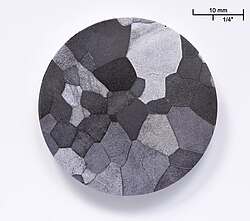


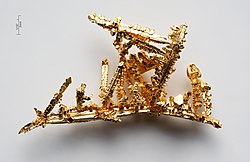
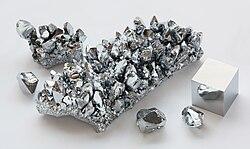
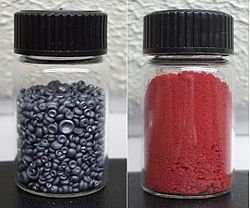
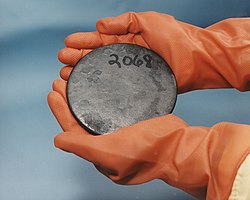


The folks at WikiProject Elements agreed to share their project with us this week. The project's 21 pieces of featured content and 44 good articles are displayed on a color-coded Periodic Table by Quality (PTQ) initially created as an image by Cryptic C62 and turned into a wiki-formatted table by Lanthanum-138. The project strives to achieve a set of short term, mid term, and longer term goals, but their ultimate goal is to turn the PTQ completely blue (all featured articles). The project has been chugging through 16 good article nominations in the past three months, most recently seeing the promotion of Cadmium on June 8. The project is a child of WikiProject Chemistry (interviewed in 2009) and parent of WikiProject Isotopes, although the latter was reduced to a task force in March and is currently being reintegrated into WikiProject Elements. The project contributes to the Chemistry Portal. We had a lively interview with five members of WikiProject Elements:
mav co-founded the project with Bryan Derksen in early 2002 and recalls that "the best element articles back then would be rated as start class today and the vast majority would be considered stubs; most of those just had a single sentence in the form 'X is an element in the periodic table with the symbol Y and atomic number Z.'" He has a degree in biology and states that chemistry was not his strongest subject in college, although he "found high school chemistry very rewarding and easy to learn." He set to work de-stubbing 70 element articles and along the way "got a bit obsessed with adding a table of properties" to beryllium, which led to the creation of the project's infobox and standard article layout. When asked what his favorite element was, he replied: "Asking me to choose a favorite element is like asking a parent to choose a favorite child, so I won't go there. :)"
Stone is a chemist with a Ph.D. in organic chemistry and is working on a Mars project, although he claims he is "not really an expert on chemical elements." He was looking into FAR in June 2008 when he noticed Helium was listed for review. He "wanted to help to save the star on Helium" and after succeeding with the help of "a whole bunch of very enthusiastic Wikipedians," he was drawn into the project. Instead of simply adding his name to the project, Stone felt he needed "to do something to earn the privilege" and started working on "a corner of the periodic table which was neglected." As to his favorite element, "it is hard to name one, only as a whole they are beautiful."
R8R Gtrs is a student planning a career as an economist, although he finds chemistry interesting. He joined WikiProject Elements because the small project had a "clear graphic presentation on how close it is to the ultimate target" and the collaborative environment provided him with an opportunity to improve his English. When asked what his favorite element was, he noted that the "concept of favorite element seems weird to me" but recalled his history with sodium which he and his "mates back in school used to steal and make react with water."
Freywa is a high school student in Singapore who joined the project because he was interested in chemistry and "needed to do something on Wikipedia." His favorite element is vanadium which was named after the Norse goddess Freyja, an inspiration for his username along with the goddess Eywa from Avatar. He hopes to see more Singaporeans becoming regular contributors to Wikipedia and wanted to say: "da-da da-da da-da-da-da-BOOM!"
Lanthanum-138 "found this the most organised project I tried working with" and liked that it was "a smallish project with a clear visual goal." He also works with WikiProject Mathematics and the classical music WikiProjects, but prefers WikiProject Elements because the other projects "were just too large." His username is an isotope of lanthanum.
Have you contributed to any of the project's featured content or the project's good and A-class articles? Did you help develop the project's periodic table by quality tool?
mav: I'm a primary author and nominator of eight FA element articles. Cryptic C62 developed the original periodic table by article quality, which I think has really helped galvanize the project by giving us a visual goal - to turn that periodic table green and then blue.
R8R Gtrs: I've brought fluorine and copernicium to GA status, the former is at FAC. I'm planning more, though — soon submit group 3 element to GAN, and bring copernicium and lutetium to FA later. Not much, but I'm a member only several months.
Stone: I contributed a big chunk to six soon seven FAs and I am the major contributor to 20 of the GAs. It takes too much time to get them to FAs, real life takes its toll. But I try where ever somebody is improving a element to help with credible references and some chemistry. Cryptic C62’s periodic table was the start and it made it easy to follow the progress.
Freywa: I am the reviewer of quite a few GAs (including beryllium and samarium) and the nominator of another (copper, a vital article). I was the initiator of a proposal to include element categories, blocks and the extended periodic table that later got scrapped to avoid intimidation.
Lanthanum-138: For me, similar to Freywa. By the way, the extended periodic table idea is still in the periodic table by quality, but in a very limited form. I do have something with the history of that periodic table by quality: I turned it into a wiki-formatted table (WP:ELEM/PTQ). Fortunately, this has not supplanted the original image table. I'm not exactly a fan of the FA process - it just takes too long, but I try to get articles to GA as far as possible. In fact here we have A's below GA's (which I find all right, but not all of us seem to).
The project has been very active in the past three months, adding 16 new good articles and conducting three peer reviews. There are also two good article nominations and one featured article candidate in progress. What caused this burst of activity? What could other projects learn from your project's recent efforts?
mav: I can't claim any credit for the current burst of activity, but re-organization of the project pages by Nergaal, a persistent focus on keeping track of and setting article ratings by Cryptic C62, Nergaal and Stone (among others), and constant article maintenance and expansion by long-time project members like Materialscientist, Stone, and Sbharris (just to name a few from recent changes), have formed a foundation upon which this burst could happen. Interest by GAN reviewers and nominators, such as Freywa and Lanthanum-138 along with focused energy from members like R8R Gtrs to bring articles to that level and beyond were the final missing elements (pun intended). But the main thing other projects should learn is that activity begets more activity; even chemistry geeks are inherently social and gravitate to topic areas where others are working, even if they prefer to work on individual articles alone.
Stone: The creation of several articles in one single edit from user Materialscientist made it easy to get them to GAs. When user mav shows up and lays hand on one of the articles he always aims for a FA. Some new project members showed up and created a lot of enthusiasm for improvement. Another point is that there were several B-Class articles very close to GA status which are now GA. Like always there is not a single cause but a bunch.
The project classifies articles by importance. How are these importance ratings determined? What makes one element more important than another?
Freywa: The importance ratings are determined by how frequently the topic of the article is used in the real world. This means, for example, that copper is more important than copernicium because copper is widely used in all aspects of society while copernicium is the subject of only esoteric scientific journals about nuclear physics, not understood by many.
Lanthanum-138: We don't really care much about the importance, though: we just plough ahead and get it to GA and/or FA standard. I'd like to add that these importance standards are not rigid: ununoctium is for some reason at High (probably because it's an FA) while ununhexium is still at Low. I think why we don't care much about importance is that it doesn't show many prospects for improvement. Ununhexium would not go from Low-importance to High-importance unless (suppose) it gets used in the latest Apple product, which isn't likely at all ;-), or it gets to GA/FA, which probably won't happen soon.
R8R Gtrs: Ununoctium is interesting as a noble gas, but a notable exception and maybe not one. In general, the ratings come from higher notability (both social and scientific) and article views. Also, articles that aren't elements usually get lower importance, like a notable nuclide uranium-235.
How difficult has it been to acquire high quality, properly licensed images of elements?
Freywa: It varies greatly. Transition metals are the easiest: Alchemist-hp has made a whole collection of pictures for them, all of them featured pictures. Stable lanthanides, s-block elements and p-block elements are relatively easy to get. It's the elements beyond bismuth that are hardest because of their radioactivity: there have been ruses over the authenticity of the picture for astatine.
Lanthanum-138: I remember when I first started on this, we were using some images from RSC (http://www.rsc.org/chemsoc/visualelements/index.htm) for some of the radioactives. However, they turned out to be fakes (oops!) and down went my thorium picture from them. (With hindsight, something was definitely the matter if the promethium, protactinium and americium pictures all looked pretty much the same.) Then soon after that we had the huge turmoil with Jurii's well-meaning but fake pictures of the radioactives (which ironically weren't used anyway, but what was happening on other wikis was becoming too dangerous). See the details here and here. After that things sort of calmed down a bit, and we had twelve elements missing pictures. Then I started searching stuff on Google Images and getting tip-offs from Nergaal (thanks a lot!) at here, and I uploaded most of those left (Nergaal contributing the rest). Now only promethium and fermium don't have images; any help is obviously appreciated! But please don't fall for compounds of promethium - in fact, that's basically why we don't have a picture yet: everyone uses the oxide or chloride to signify promethium.
When we interviewed WikiProject Chemistry in 2009, Walkerma commented that the Chemistry project is a far less cohesive group than WikiProject Elements. Do you agree? If so, why has your project formed such a strong community?
Freywa: I agree. Our project has formed a really strong community because of the much narrower scope (around 180 actual articles compared to the 4000 mentioned in the WikiProject Chemistry interview) and the continued enthusiasm of the participants. This leads to a strong motivation to improve exact articles to their highest calibre than improve a lot of articles to a decent level.
mav: Smaller projects and task forces inside larger projects give participants the ability to feel their contribution is really meaningful to that project or task force. Having a high profile set of articles certainly doesn't hurt, nor does having a nifty way to display progress on improving that set of articles.
Stone: I know both groups. In the chemistry project even the smallest niche to live in is several tens of articles. For example if you do all chemical reactions it might be the case that you never interact with the Wikipedian doing the organofluorine chemistry. Interaction means team building and this is complicated if it only happens at the project page. So working together on an article you learn fast what the people are like.
Lanthanum-138: Here we really have enthusiastic editors who keep working on a specific article, and there really doesn't seem to be much burnout or loss of interest. At the same time, if an article is going to possibly lose GA- or FA-status, most of us come and help, so much so that only three articles have ever lost their GA-status and only one has lost their FA-status (ironically that article is periodic table itself), and out of those three former GAs, one of them has since regained its status. Also, on a more positive note, if an article is at GAN or FAC, we all come and help work on it.
WikiProject Elements is one of the few projects that awards unique triple crowns to editors who have created a DYK, substantially contributed to a good article, and contributed a piece of featured content. Should all projects offer rewards like these to their most active contributors? Are there downsides to offering tangible rewards for editing?
Freywa: I am opposed to the idea of offering triple crowns - barnstars are much better at rewarding editors. There isn't any significant downside to rewards for editing, except (I think) the awardee having a slightly decreased activity level after the presentation of the award (resting on laurels).
mav: If those type of awards inspire some editors to work hard to get them, then all the better. But Freywa is correct in that the Triple Crown is self-limiting as far as the individual editor is concerned; I prefer open ended accounting, like the number of successful FAC or GAN nominations.
Stone:The most fulfilling thing to get is that somebody I respect appreciates what I do, with a triple crown or a barnstar or a simple talk page message I do not care. I always try to carry on when somebody likes what I have done.
What are the project's most pressing needs? How can a new contributor help today?
R8R Gtrs: It could be sweet to get rid of that big yellow island on our PTQ on the right side, turning it into green. We also have a list of goals on our main page. But anyway, if a user decides to join, he may work on whatever he/she wants, it's still appreciated. And these aren't just words :)
Freywa: We are in need of free images for elements for which only fair use versions exist (like fluorine), images (whether free or not) of promethium and fermium, and editors who can handle the extreme stress required to work articles to FA status. New contributors can help today by improving the C-class, Start-class and Stub-class articles to B-class.
Lanthanum-138: Improve the articles! They're quite high-profile anyway, so your efforts will not go unnoticed. Just think: if you look at the periodic table by quality's history, you can see the efforts we've made from 2008 to the present. Before, we had a big swath of Start-class articles. Now, that swath is largely B-class. Which reminds me: work on getting articles to GA or FA is always appreciated.
mav: Help make the Internet not suck by improving element articles. Most of our project's articles are high profile and widely read so your efforts will have a large impact on a generation of high school and college students. Help review articles that need feedback at FAC, FAR or peer review. Other than that, focus on improving start and C class articles to B class, which is fairly easy and often more useful to readers compared with the effort needed to get articles ready for GAN and especially FAC.
Stone: Young and fresh editors are always the thing needed most. If you have a lot of people they will pick whatever they like to do and the project will flourish.
Next weeks' Report will be a limited edition still in mint condition which is sure to be highly prized by generations of pannapictagraphists. Until then, collect all our previous issues in the archive.
Reader comments



Monty Hall problem (nom) was delisted for reasons of prose, referencing, stability, POV and MOS compliance.
Six lists were promoted:
Two images were promoted. Medium-sized images can be viewed by clicking on "nom":
The Arbitration Committee opened one new case, and closed one case. Two cases are currently open.
The case was opened to examine allegations of incivility, unnecessary aggression, battleground behavior, disruptive editing, as well as inappropriate and unnecessary use of the blocking tool. A few days after the case was opened, arbitrator Risker blocked the filer of the case, Chester Markel (talk · contribs), as a sockpuppet of a banned user. Arbitrators noted that this development will not invalidate the case, the case will continue as scheduled, and that the Community might want to make suggestions on how to mitigate its potential influence on the end result of the case. During the week, 9 editors and the now-banned sockpuppet filer submitted 43 kilobytes in on-wiki evidence.
See earlier Signpost coverage for background about this case. Additional comments were submitted on the workshop proposals that were submitted last week.
This case was opened after allegations of harassment, outing, sockpuppetry, and disruptive editing. The case was to address the behavioral concerns surrounding Racepacket (talk · contribs), the subject of this case, and to review the behavior of all editors involved in the GA processes concerning netball articles. 13 editors, including one recused arbitrator, and a now-banned sockpuppet, submitted evidence on-wiki. Several proposals were submitted in the workshop, including a proposed decision by drafter PhilKnight, all of which received comments from arbitrators, parties, and others. Drafter PhilKnight amended the proposals before submitting them in proposed decision for arbitrators to vote on. Additional proposals were also submitted, several of which were drafted by arbitrator Risker. 12 arbitrators voted on the decision, before the case came to a close yesterday.
According to Deputy Director of the Wikimedia Foundation Erik Möller, the foundation's Engineering Department will be reorganised with immediate effect. The department, which handles the technical side of the WMF's operations, will now be split into four sub-departments (wikitech-l):
These four departments will be augmented by three special "architect" roles, representing "an additional career path for our distinguished engineers beyond 'become a manager'". Two new roles will therefore be created to accompany the existing position of Lead Software Architect held by newly returned ex-CTO Brion Vibber: Lead Operations Architect (Mark Bergsma) and Lead Platform Architect (Tim Starling). Möller also acknowledged the current positions of Senior Product Manager (held by Howie Fung) and Senior Research Analyst (Dario Taraborelli) to help the Engineering Department to integrate with other stakeholders in the wider movement.
Möller added that he will be taking on the role of overall head of the Engineering Department, at least on a temporary basis. As such, no new CTO will be recruited to replace Danese Cooper, who announced her resignation a fortnight ago (see previous Signpost coverage).
In theory, all changes to the MediaWiki software should be run against an automated test suite, incorporating parser tests, unit tests (tests of individual actions, such as page deletions); since May's Berlin Hackathon, this list has included JavaScript tests. However, in practice MediaWiki has not run as tight a ship as some of its larger counterparts such as Mozilla. For example, before October last year, the system for automating parser tests was considered broken. When that system was replaced in favour of an automated test system known as "CruiseControl" (implemented as part of the phpUnderControl suite), hopes were high that MediaWiki could move to a more rigorous system of speedily reverting any changes that broke the software. Nonetheless, the system immediately suffered from the fact that tests took so long to run that the results were out of date by the time of their publication. In May this year the decision was announced to exclude these long-running tests. Even so, though tests were now quicker, the consistent failure of a number of tests hurt the ideal of a fast revert for all bad code.
On 15 June, developer Chad Horohoe announced that work on reducing the number of permanently failing tests to zero had been successful (wikitech-l mailing list). This has delivered two benefits: firstly, it means that the current bleeding edge code (known as trunk) is free of the many bugs tested for by the suite (check its current status). Secondly, if a test fails in the future, it will be possible to pinpoint the revisions that broke the software, and revert them or otherwise fix the problem within minutes. "From here on out", wrote Horohoe, "I'm going to take the stance that if you break a test, it must be fixed or reverted on sight". Those who follow the MediaWiki development cycle will no doubt hope that this will significantly reduce the time needed to get code from trunk to production, and so help MediaWiki towards a faster release cycle. In a separate announcement, developer User:Krinkle noted that a parallel set of JavaScript-based tests are now also functioning (also wikitech-l).
Not all fixes may have gone live to WMF sites at the time of writing; some may not be scheduled to go live for many weeks.

